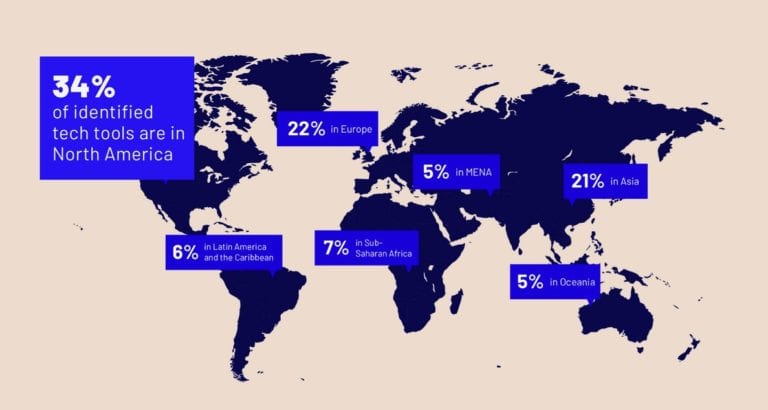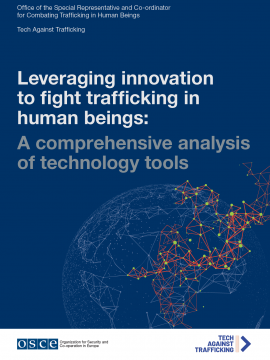
The OSCE launched today a ground-breaking study analyzing more than 300 anti-trafficking tech tools. The launch of the first ground-breaking research on how technology is being used to prevent and combat trafficking in human beings, took place today in an online event of the Organization for Security and Co-operation in Europe and Tech Against Trafficking, a coalition of international technology companies.
Click here for the interactive map.

This first-ever joint project between the OSCE and TAT has produced „Leveraging innovation to fight trafficking in human beings: a comprehensive analysis of technology tools.” The study examines how technology is misused to facilitate trafficking, how more than 300 hundreds of tech tools have approached the problem, and how governments, civil society, and the private sector can strategically use tech to combat trafficking.
It is estimated that there are about 25 million victims of human trafficking globally. More and more of them are exploited online. Traffickers are widely misusing technology to advance their criminal activities. Yet, technology can be used to support prosecution, prevention, and protection of victims: the intersection of technology and trafficking in human beings is one of the defining topics of the global conversation on efforts to end human trafficking.
„Today, we have heard very clearly about the crucial importance of addressing the double-edged sword that technology is for human trafficking. Indeed, countries’ future success in eradicating human trafficking will depend on how they are prepared for and equipped to harness technology to fight this crime”, ” said Valiant Richey, the OSCE Special Representative and Co-ordinator for Combating Trafficking in Human Beings (SR/CTHB).
The study
The OSR/CTHB-TAT publication identifies and analyses more than 300 technology initiatives while also addressing ethical considerations, data protection issues, and the need to respect rights in the use of technology. A strong emphasis has been put on fighting human trafficking through market-based interventions, data aggregation, and analysis tools, which can identify significant trends in the THB marketplaces and can engage a large number of THB actors at the same time.
The research also highlights tools that can impact fighting THB for labor exploitation in global supply chains, including block-chain technology. These tools are designed to scale up responses and prevention of THB on a worldwide scale.
According to Thi Hoang Analyst at GI-TOC Network coordination (Global Initiative against transnational organized crime), the landscape analysis yields relevant recommendations: „The tech industry must initiate and develops solutions which take into account the target users’ internet and digital capacities, as well as their regions’ technological infrastructure. They should also prioritize tools that help with victim case management and support – the tool type currently underrepresented according to our analysis. Further, to avoid duplication of efforts, it is recommended that these anti-trafficking tools are made open source and/or shared and exchanged with other stakeholders in the field.”
The paper also provides a set of general recommendations for all actors involved in the use of technology to combat trafficking and a more specific set of recommendations for governments, including establishing or strengthening partnerships with tech companies to invest in research and development.
What is the OSCE?
With 57 participating States in North America, Europe, and Asia, the OSCE – the Organization for Security and Co-operation in Europe – is the world’s largest regional security organization. The OSCE works for stability, peace, and democracy for more than a billion people, through political dialogue about shared values and practical work that aims to make a lasting difference.
The OSCE is a forum for political dialogue on a wide range of security issues and a platform for joint action to improve individual’s and communities’ lives. The organization uses a comprehensive approach to security that encompasses the politico-military, economic and environmental, and human dimensions. Through this approach, and with its inclusive membership, the OSCE helps bridge differences and build trust between states by co-operating on conflict prevention, crisis management, and post-conflict rehabilitation.
With its Institutions, expert units, and network of field operations, the OSCE addresses issues that impact our collective security, including arms control, terrorism, good governance, energy security, human trafficking, democratization, and media freedom and national minorities.
What is TAT?
Tech Against Trafficking is a coalition of technology companies collaborating with global experts to help eradicate human trafficking using technology. Through the coalition, companies, nonprofits, academics, and relevant stakeholders work together in a collaborative environment to support and accelerate the impact of technology solutions combatting human trafficking.